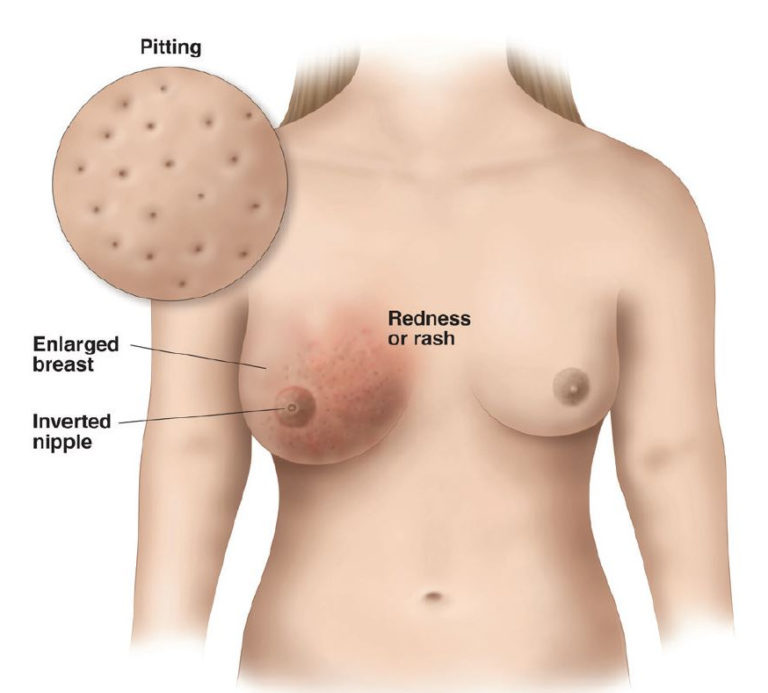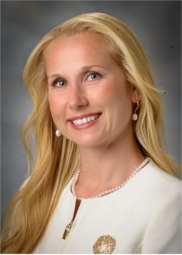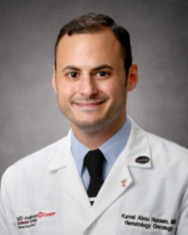
“Unfortunately, IBC presents similar to
mastitis, and a lot of women will see their
primary care physician with symptoms such
as skin redness, warmth and tenderness. The skin may also have a thick orange-peel look.” -Dr. Loveland-Jones
“It’s rapidly progressive and quite aggressive, and many women at the time of diagnosis already have lymph node involvement,” says breast surgeon Catherine Loveland-Jones, MD, associate director of the Janet Knowles Breast Cancer Center at MD Anderson Cancer Center at Cooper. “To stop it in its tracks, it’s important to move quickly.”
“It” is inflammatory breast cancer (IBC), a rare form of breast cancer that affects 0.5% to 2% of women. It disproportionately affects African American women, and they tend to be diagnosed at a younger age.
“Unfortunately, IBC presents similar to mastitis, and a lot of women will see their primary care physician with symptoms such as skin redness, warmth and tenderness,” Dr. Loveland continues. The skin may also have a thick orange-peel look.
“While it’s reasonable to do a brief course of antibiotic therapy, it’s important to keep the possibility of IBC in mind,” she advises. “If patients don’t respond to a one-week course of antibiotics, the possibility of IBC grows stronger—and the patient should be seen by a specialist as soon as possible.” MD Anderson at Cooper has launched a multidisciplinary IBC program—the only one of its kind in South Jersey—to provide fast, specialized care for this aggressive cancer.

Catherine E Loveland-Jones, MD, MS
“Given our patient population here in South Jersey, we are particularly excited to offer this program,” says MD Anderson at Cooper breast medical oncologist Kamel Abou Hussein, MD. “We deal with IBC as an emergency; patients generally can be seen by our team within 24 to 48 hours.”
“Treatment then usually begins with upfront systemic therapy,” Dr. Abou Hussein explains. “Historically we’ve used chemotherapy and sometimes add targeted therapy in combination, depending on what type of IBC we’re dealing with— hormone receptor positive, triple negative or HER2-positive disease. If the cancer is locally advanced, this neoadjuvant treatment helps us get a good handle on the disease with the goal of reducing or even eliminating it. Then we move on to surgery.”
“Mastectomy is required, along with the removal of lymph nodes,” Dr. Loveland-Jones says. “This is followed by radiation therapy, and we’ll often do additional systemic therapy on the back end. It could include chemo, or anti-hormonal treatment, tailored to the biologic profile of the cancer.”

Kamel Abou Hussein, MD
Cooper’s multidisciplinary IBC program provides streamlined access to all the specialty expertise a patient requires, including a breast surgeon, breast medical oncologist, radiation oncologist, genetic counselor and radiologist—all in one place.
“It’s coordinated, timely care following the same practices and protocols at MD Anderson in Houston,” Dr. Abou Hussein notes. “We also can give IBC patients access to clinical trials, knowing that the disease microenvironment and the potential targets are likely different for IBC compared to other types of breast cancer.” In fact, Dr. Abou Hussein is the local principal investigator for a new study for patient with metastatic IBC.
Both doctors acknowledge that the 5-year survival rate for IBC is poor, and the recurrence rate is high—due, in part, to its aggressive nature—and that the best way to optimize outcomes is to ensure patients receive the correct course of treatment, which includes systemic therapy, surgery, and radiation.
“Because IBC is very fast growing, it’s crucial that IBC be treated as quickly as possible and by specialized experts,” says Dr. Hussein.
“Early referral is key, and we’re able to see patients without delay,” Dr. Loveland-Jones adds.
Cooper’s multidisciplinary IBC program provides streamlined access to all the specialty expertise a patient requires, including a breast surgeon, breast medical oncologist, radiation oncologist, genetic counselor and radiologist — all in one place. To discuss a patient or for a physician-to-physician referral, please call Dr. Loveland-Jones at 856.735.6207 or Dr. Abou Hussein at 856.735.6115.
